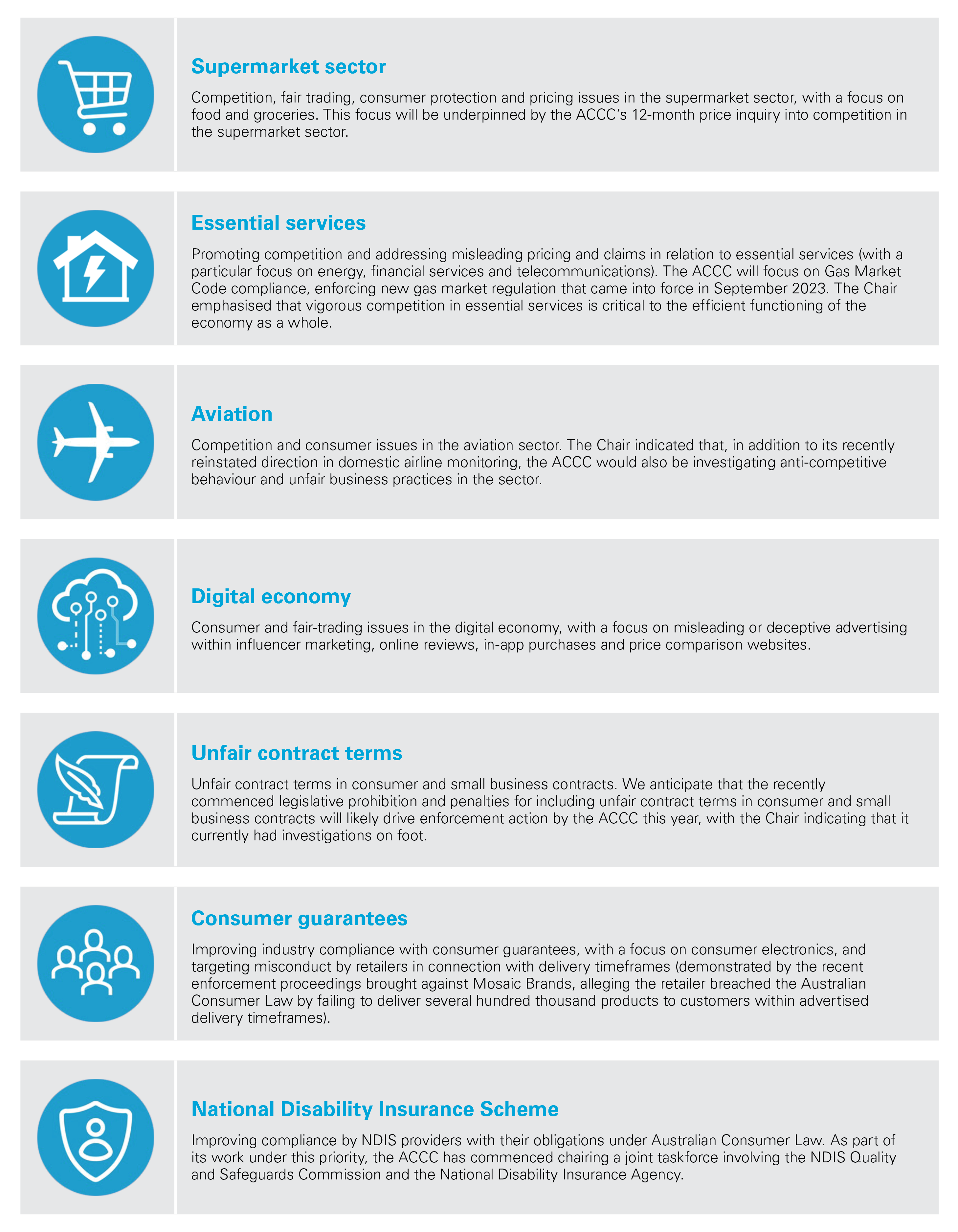
Gina Cass-Gottlieb, Chair of the Australian Competition and Consumer Commission (ACCC), this week announced the ACCC's 2024-25 Compliance and Enforcement Priorities.1 The ACCC's priorities continue to be shaped by the key economic challenges facing Australian consumers and the economy as a whole, in particular, the "existential importance" of the energy transition, digital disruption and cost of living pressures.
2024-25 Compliance and Enforcement Priorities
The ACCC's Compliance and Enforcement Priorities are consistent with the it's legislative mandate of protecting and promoting competition and enhancing the welfare of Australians. Many of the key priority areas from last year remain, with a heavy focus on the effects of conduct on consumers, particularly vulnerable consumers, and small business. The ACCC's priorities are consistent with its previously stated approach of directing resources to those matters that cause the most widespread harm, with sectors including supermarkets, energy, financial services, telecommunications, aviation and the online economy being identified as of particular focus.
Sustainability
Reflecting the continuing impact of Australia's commitment to net zero across the economy, the ACCC retained competition, consumer, product safety recalls and fair trading concerns relating to environmental claims and sustainability as a high priority for 2024-25. This priority is reflected in work across the ACCC, including the recently published principled-based guidance for business making environmental claims and multiple greenwashing investigations already on foot.
Importantly, the Chair announced that the ACCC will continue to develop its sustainability-related guidance and will this year issue guidance in relation to recognising the public benefit of facilitating the transition and improvements in sustainability in its assessment of conduct authorisations. Twenty-five percent of conduct authorisations considered by the ACCC in recent years have involved assessment of sustainability based public benefits.
Cost of living pressures
There is a clear focus on cost-of-living pressures. The exposure of Australian consumers to anti-competitive conduct, such as reduced competition in the supply of essential goods and services, restricting entry or expansion of competitors, reducing choice, and contribution to price escalation pressures, has infiltrated the ACCC’s priorities across a range of sectors. These cost-of-living priorities include:
The priorities are unsurprising, particularly given the inquiries initiated by the Government and enforcement proceedings commenced by the ACCC over the past year, including:
- the supermarkets inquiry, which is examining the pricing practices of the supermarkets and the relationship between wholesale, including farmgate, and retail prices;
- the recently published final report of the retail deposits inquiry, which recommended a number of reforms to improve transparency and clarity of terms and conditions for consumers;
- the ongoing gas and electricity market monitoring and digital platform services inquiries; and
- the recent enforcement proceedings brought against Qantas in the Federal Court of Australia, alleging the airline engaged in false, misleading or deceptive conduct, by advertising tickets for flights that it had already cancelled but not removed from sale.
Strong enforcement outcomes
The Chair emphasised the ACCC's strong enforcement record, with Court's having imposed fines of more than $620 million in the FY2023-24 year to date. This includes the recent $30 million fine imposed on Bingo Industries and $3.5 million imposed on Aussie Skips after each pleaded guilty to engaging in cartel conduct that led to increased prices for the supply of skip bins and the provision of waste processing services for building and demolition waste in Sydney. The Chair indicated that the ACCC will continue its robust cartel enforcement program, including through both civil and criminal proceedings, noting that the regulator has a number of matters currently in its enforcement pipeline.
1 Ms Gina Cass-Gottlieb spoke at the Committee for Economic Development of Australia (CEDA) on Thursday 7 March 2024 on the ACCC's '2024-25 Compliance and Enforcement Priorities' – https://www.accc.gov.au/about-us/media/speeches/committee-for-economic-development-of-australia-ceda-speech-2024
White & Case means the international legal practice comprising White & Case LLP, a New York State registered limited liability partnership, White & Case LLP, a limited liability partnership incorporated under English law and all other affiliated partnerships, companies and entities.
This article is prepared for the general information of interested persons. It is not, and does not attempt to be, comprehensive in nature. Due to the general nature of its content, it should not be regarded as legal advice.
© 2024 White & Case LLP



